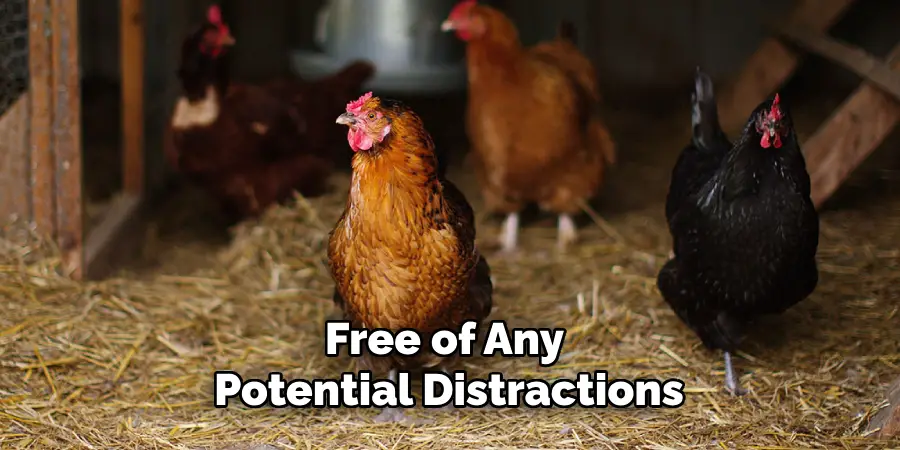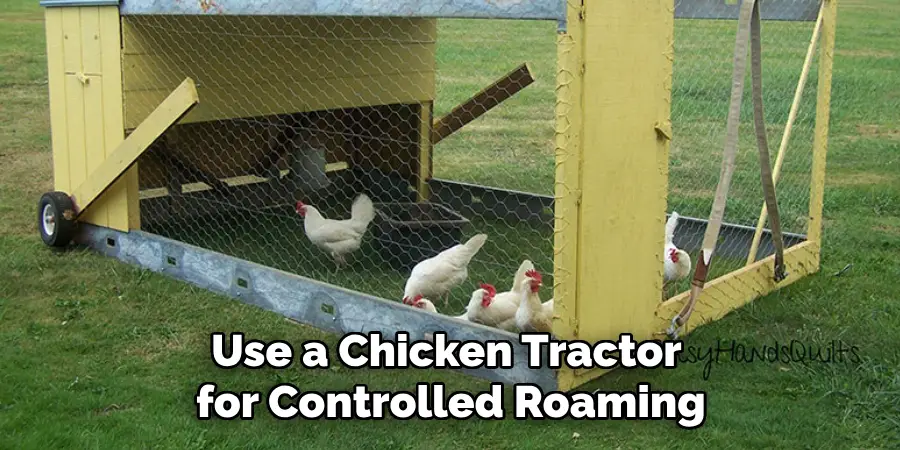Chickens are a popular option for many people who want to raise their own food, as they are relatively low maintenance and provide a source of fresh eggs. However, it can be frustrating when your free-range chickens refuse to lay in their coop.

Not only does this make it difficult to collect eggs, but it can also leave the eggs vulnerable to predators or other hazards. In this guide on how to get free range chickens to lay in coop, we will discuss some tips and tricks for getting your free-range chickens to lay in their coop.
Necessary Items
Before we delve into the methods for getting your chickens to lay in their coop, it is important to ensure that you have all the necessary items. These include:
- A Secure and Comfortable Coop: This should be a safe and cozy space for your chickens to roost and lay eggs. Make sure it is predator-proof and has enough nesting boxes for your flock.
- Adequate Space: Free-range chickens need plenty of space to roam and forage. If they feel cramped, they may not want to return to the coop.
- Fresh Water and Food: Chickens require a steady supply of fresh water and food for optimal health and egg production.
12 Steps on How to Get Free Range Chickens to Lay in Coop
Step 1: Understanding Your Chickens’ Natural Behavior
Before we dive into specific strategies, it’s important to understand why your chickens may not be laying in the coop in the first place. Chickens are naturally inclined to seek out secluded and secure locations for nesting, as this is where they would typically lay their eggs in the wild. This behavior can be attributed to instincts developed over thousands of years of evolution.
Step 2: Timing Is Everything
Chickens typically lay their eggs in the morning, so it’s important to make sure your nesting boxes are easily accessible during this time. If you have a large flock, consider installing multiple nesting boxes to prevent overcrowding and competition.

Step 3: Make the Nesting Boxes Appealing
Chickens prefer to lay their eggs in clean, dark, and secluded areas. Keep your nesting boxes clean and add a layer of soft bedding, such as straw or wood shavings, to make them more inviting. And don’t forget to provide enough nesting boxes for each chicken, as they may fight over a favorite spot.
Step 4: Entice Them with Treats
Just like humans, chickens can also be motivated by food. Try placing some treats or feed in the nesting boxes to encourage your chickens to explore and use them. Some popular options include mealworms, sunflower seeds, or even bits of fruit.
Step 5: Provide a Comfortable Roosting Area
Chickens need a place to roost at night, and if their coop doesn’t have adequate perches, they may choose to sleep outside instead. Make sure your coop has enough perches for all of your chickens and that they are comfortable and secure.
Step 6: Keep the Coop Clean
Chickens are clean animals and prefer a tidy living space. Regularly cleaning out their coop not only keeps them healthy but also makes it more appealing for them to return to lay eggs. Also, don’t forget to remove any eggs that have already been laid to prevent them from rotting and attracting pests.
Step 7: Provide Enough Space
As mentioned earlier, free-range chickens need plenty of space to roam. If your coop is too small or overcrowded, your chickens may not want to return to lay their eggs. Make sure your flock has ample space to move around and forage.
Step 8: Create a Distraction-Free Zone
Chickens can easily get spooked by loud noises or unfamiliar objects, which may prevent them from returning to their coop. Make sure the area around the coop is free of any potential distractions, such as noisy machinery or curious pets.

Step 9: Use Artificial Lighting
If your chickens are not laying during the winter months when daylight hours are shorter, you may need to use artificial lighting to simulate longer days. This can help keep their natural laying schedule and encourage them to lay in the coop.
Step 10: Be Patient and Consistent
It may take some time for your chickens to get used to laying in the coop, especially if they have been free-range for a while. Be patient and consistent with your efforts, and eventually, they will learn to return to the coop when it’s time to lay.
Step 11: Observe Your Chickens’ Behavior
Every flock is unique, so keep an eye on your chickens’ behavior and preferences. They may have a specific spot or routine for laying, so try to accommodate their preferences as much as possible.
Step 12: Consider a Nesting Box Relocation
If all else fails, you may need to consider moving the nesting boxes to a different location. Some chickens may simply prefer certain spots over others, and relocating the boxes can help encourage them to use them.
With these tips and tricks, you should be able to get your free-range chickens to lay in their coop in no time.
Remember to be patient and consistent, and always prioritize the safety and comfort of your flock. So take care of them properly by providing a secure coop with adequate space, fresh water and food, clean nesting boxes, comfortable perches, and a distraction-free environment, and your chickens will reward you with a bountiful supply of fresh eggs.
9 Safety Measures to Protect Your Free-Range Chickens

While free-range chickens have the benefit of being able to roam and forage freely, they also face potential risks. To ensure the safety of your flock, here are nine safety measures you should consider:
1) Secure Fencing
A sturdy fence can help protect your chickens from predators such as foxes or coyotes. And if you have a particularly determined predator, consider installing an electric fence for added protection. So, make sure your fence is secure and regularly check for any holes or weak spots.
2) Predator-Proof Coop
Your chickens will need a safe place to roost and lay eggs. Make sure their coop is built with sturdy materials and has no openings that predators can access. Also, consider adding additional measures such as latches or locks to keep predators out.
3) Provide Shelter
Chickens can also face risks from harsh weather conditions, so it’s important to provide them with shelter. Make sure their coop is well-insulated and has enough ventilation to prevent overheating. Even if your chickens are free-range, they should have access to their coop in case of severe weather.
4) Regularly Check for Pests
Pests such as mites and lice can cause health issues for your flock. Inspect them regularly and take necessary measures to prevent or treat infestations. Keep the coop clean and use natural remedies such as diatomaceous earth to deter pests.
5) Supervise Free-Ranging
While it’s great to let your chickens roam freely, it’s important to keep an eye on them. Make sure they don’t wander too far and are not in danger of getting lost or attacked by predators. If necessary, limit their free-ranging time or use a chicken tractor for controlled roaming.

6) Trim Nearby Bushes and Trees
Tall bushes and trees can provide hiding spots for predators, so make sure to trim them regularly. This will also prevent any potential hazards, such as branches falling on your chickens or obstructing their access to the coop.
7) Provide Clean Water and Food
Aside from a clean living space, your chickens also need access to fresh water and food to stay healthy. Make sure to clean their water sources regularly and provide them with a balanced diet.
8) Secure Nesting Boxes
Nesting boxes can also attract predators looking for an easy meal. Keep them secure by making sure they are sturdy and have no openings that predators can access. However, don’t make them too secure that your chickens have trouble accessing them.
9) Be Proactive
Finally, always be proactive when it comes to the safety of your flock. Regularly assess and address any potential risks or hazards in their environment. A little prevention can go a long way in protecting your chickens from harm.
By following these safety measures on how to get free range chickens to lay in coop, you can ensure the well-being and protection of your free-range chickens, allowing them to thrive in their natural habitat. Remember to always prioritize their safety and comfort, and you will have happy and healthy chickens that provide you with delicious eggs.
So, take care of them properly by providing a secure coop with adequate space, fresh water and food, clean nesting boxes, comfortable perches, and a distraction-free environment, and your chickens will reward you with a bountiful supply of fresh eggs.
8 Things to Avoid When Raising Free-Range Chickens

Raising free-range chickens can be a rewarding experience, but it also comes with its challenges. To ensure the health and well-being of your flock, here are eight things you should avoid:
1) Overcrowding
Overcrowding in the coop can lead to stress and health issues for your chickens. Make sure to provide enough space for each chicken to move and roost comfortably.
2) Inadequate Ventilation
A well-ventilated coop is crucial for the health of your chickens. Poor ventilation can lead to respiratory problems and other health issues. Make sure there is proper airflow in the coop, but also avoid drafts that can cause sickness.
3) Lack of Cleanliness
A dirty coop can harbor bacteria and pests, which can be harmful to your chickens. Regularly clean the coop and nesting boxes to maintain a healthy living environment for your flock. Also, make sure to dispose of manure properly.
4) Insufficient Food and Water
Free-range chickens have the benefit of foraging for food, but they still require a balanced diet and access to fresh water. Make sure their feeders and water sources are always clean and well-stocked.
5) Neglecting Nesting Boxes
Nesting boxes should be cleaned regularly to prevent health issues and encourage your chickens to lay eggs in them. Neglecting this can result in dirty, uncomfortable nesting boxes that may deter your chickens from laying.
6) Leaving Chickens Unsupervised
While free-ranging is great for chickens, leaving them unsupervised can lead to potential risks and dangers. Make sure to keep an eye on them and provide a safe environment for them to roam. If necessary, consider using a chicken tractor for controlled free-ranging.
7) Letting Chickens Roam at Night
It’s not recommended to let chickens roam freely at night as they are more vulnerable to predators. Make sure to secure them in their coop before dark to protect them from potential attacks. Just like humans, chickens also need a good night’s rest.

8) Not Checking for Signs of Illness
It’s important to regularly check your chickens for any signs of illness or injury. Catching and treating health issues early can prevent them from spreading to the whole flock and potentially save lives.
Make sure to familiarize yourself with common chicken illnesses and their symptoms.
By avoiding these things on how to get free range chickens to lay in coop and being proactive in taking care of your chickens, you can ensure a healthy and happy flock.
Keep an eye on their behavior, provide them with a clean and safe living environment, and address any potential risks or issues promptly. With proper care, your free-range chickens will thrive and bring joy to your backyard.
8 Additional Tips for Raising Free-Range Chickens
Aside from the basic safety measures and things to avoid, here are eight additional tips to help you successfully raise free-range chickens:
1) Have a Varied Diet
In addition to foraging, it’s important to provide your chickens with a varied diet. This can include kitchen scraps, fruits and vegetables, and even insects and worms. A diverse diet will ensure your chickens receive all the necessary nutrients for optimal health.
2) Provide Dust Baths
Chickens love taking dust baths, and it’s actually important for their hygiene. It helps them get rid of parasites and excess oil in their feathers. Provide a designated area with dry dirt or sand for your chickens to take regular dust baths.
3) Use Natural Pest Control
Pests such as fleas, mites, and worms can be a common issue among free-range chickens. Instead of using harmful chemicals, opt for natural pest control methods like diatomaceous earth or herbs that repel pests.
4) Incorporate Perches and Ladders
Chickens enjoy roosting and perching, so make sure to provide them with enough space to do so. Perches and ladders not only give them a place to rest but also add enrichment to their environment.
5) Keep Good Company
Chickens are social creatures and enjoy the company of other chickens. Keep at least two or more chickens together to prevent loneliness and behavioral issues. Even if you have a small flock, it’s beneficial to introduce new chickens periodically.
6) Monitor Egg Production
Keep track of your chickens‘ egg production to ensure they are healthy and laying regularly. A decrease in egg production can be a sign of illness or stress. It’s also important not to rely on their eggs as your only source of food and supplement with store-bought eggs if necessary.
7) Give Them Space to Roam
Free-range chickens need adequate space to roam and forage. Consider the size of your flock when planning their living environment, and make sure they have enough space to move freely without feeling overcrowded.
8) Consider Their Safety When Choosing Plants
If you plan on letting your chickens free-range in your backyard, be mindful of the plants you have. Some plants can be toxic to chickens if ingested, so do your research and avoid having these plants in areas accessible to them.

By implementing these tips into your free-range chicken-raising practices, you can ensure a happy and healthy flock that will provide you with fresh eggs and endless entertainment. Remember to always prioritize the well-being of your chickens and address any potential issues promptly.
Frequently Asked Questions
Is it Better to Free-range or Keep Chickens in a Coop?
Both options have their benefits and drawbacks. Free-ranging allows chickens to exhibit natural behaviors and forage for food, but they are more vulnerable to predators and potential health risks. Coop-raising provides protection and hygiene, but chickens may not have as much freedom and may become bored without stimulation. It ultimately depends on your personal preference and the resources available to you.
How Much Space Do Free-Range Chickens Need?
Ideally, free-range chickens should have at least 10 square feet of space per bird. However, this can vary depending on the size of your flock and their breed. Make sure they have enough space to roam and forage without feeling crowded.
Do I Need to Provide Feed and Water for Free-Range Chickens?
Yes, it’s important to provide a balanced diet and clean water sources for your free-range chickens. While they may find natural food sources while foraging, they shouldn’t be relied upon as their main source of nutrition. It’s also crucial to regularly check and refill their water sources to prevent dehydration.
Can I Let My Chickens Roam at Night?
It’s not recommended to let chickens roam freely at night as they are more vulnerable to predators. Make sure to secure them in their coop before dark to protect them from potential attacks. Just like humans, chickens also need a good night’s rest.
Conclusion
Raising free-range chickens can be a rewarding and fulfilling experience, but it also requires proper care and attention. By following these tips on how to get free range chickens to lay in coop and being proactive in addressing any potential issues, you can ensure the health and happiness of your flock. Remember to always prioritize the well-being of your chickens and provide them with a safe and clean environment to thrive in.
About
Outdoor Fixes is a distinguished figure in the world of Diy design, with a decade of expertise creating innovative and sustainable Diy solutions.
His professional focus lies in merging traditional craftsmanship with modern manufacturing techniques,
fostering designs that are both practical and environmentally conscious. As the author of diy,
outdoorfixes delves into the art and science of outdoorfixes-making, inspiring artisans and industry professionals alike.
Education RMIT University
(Melbourne, Australia) Associate Degree in Design (Outdoor Fixes) Focus on sustainable design, industry-driven projects,
and practical craftsmanship. Gained hands-on experience with traditional and digital manufacturing tools, such as CAD and CNC software.
Nottingham Trent University
(United Kingdom) Bachelor’s in outdoorfixes.com and Product Design (Honors) Specialized in product design with a focus on blending creativity with production
techniques. Participated in industry projects, working with companies like John Lewis and Vitsoe to gain real-world insights.
Publications and Impact
In diy, Outdoor Fixes his insights on indoor design processes, materials, and strategies for efficient production.
His writing bridges the gap between artisan knowledge and modern industry needs, making it a must-read for both budding designers and seasoned professionals.

